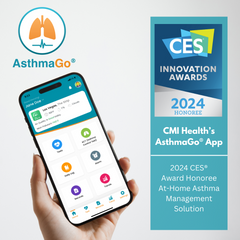Your cart is empty now.

Reasons To Purchase a Pulse Oximeter for Your Newborn Baby | CMI Health
Bringing a new bundle of joy home is one of the happiest times in a person’s life. However, the first few weeks in an infant’s life can also be the most dangerous, depending on their health. Unfortunately, Sudden Infant Death Syndrome (SIDS) and congenital heart defects are common in newborns, and they can be difficult for parents to detect.
In one study of 30 infants, the most common diagnoses were bronchiolitis, apnea or brief resolved unexplained event, hypoplastic left heart syndrome, and double outlet right ventricle (Jama, 2018).
So equipping yourself with the proper in-home monitoring devices (See reasons to have a Pulse Oximeter at Home) can be of great help when tracking your child’s condition. Continue on to find out how pulse oximeters can aid in monitoring the health of your newborn baby.
Easy Tracking Capabilities
Home pulse oximeter sensors allow you to track your child’s oxygen intake and heart health as often as you deem necessary. The process is quick and easy, with readings only a few button-presses away. Best of all, specialized infant sensors fit snuggly against their foot—which guarantees more accurate results, even if they’re squirming throughout the process. With this, you’ll be able to monitor and record your baby’s results and interpret whether there’s cause for alarm.
Potential To Diagnose Problems Early
A handheld pulse oximeter can also help you pinpoint potential health issues early on in your baby’s development. Should your child exhibit any breathing or heart issues, their readings may reflect as such—allowing for a quicker diagnosis and course of treatment. However, a newborn’s heart can beat anywhere from 70 to 190 beats per minute (Medline Plus, 2019), so don’t be alarmed if it appears higher than you’re used to seeing in an adult individual. But their oxygen levels should always be between 95 and 100 percent.
Your Pediatrician Stays in the Loop
Another important reason to purchase a pulse oximeter for your newborn baby is so that you can keep your pediatrician informed on their condition. While your doctor can’t be with your child all the time, you can—and the information you gather outside of doctor visits could be critical in how they treat your child. As such, it’s never a bad idea to provide them with any strange results or potential symptoms that your oximeter picks up.
For more information on the best practices when it comes to pulse oximeter usage and your infant, you can visit this helpful guide created by the Children's Hospital of Colorado.
If you need a home pulse oximeter model to help track your family’s health, reach out to CMI Health Inc. We carry everything from pediatric pulse oximeter sensors for infants to adult models that attach securely around the finger. This way, you can be sure that all your loved ones are breathing well and living happily—regardless of their existing medical conditions.
One important thing to note is the accuracy of these at-home products. One should always buy FDA-cleared ones, in order to ensure accuracy and reliability (Jama, 2018).
For additional information, see How Accurate Are Pulse Oximeters.



